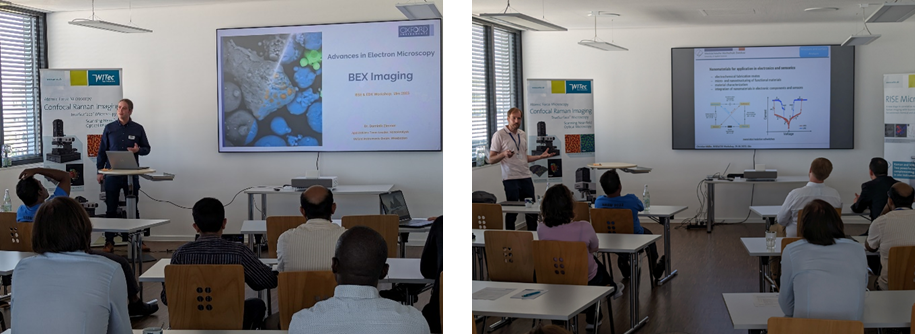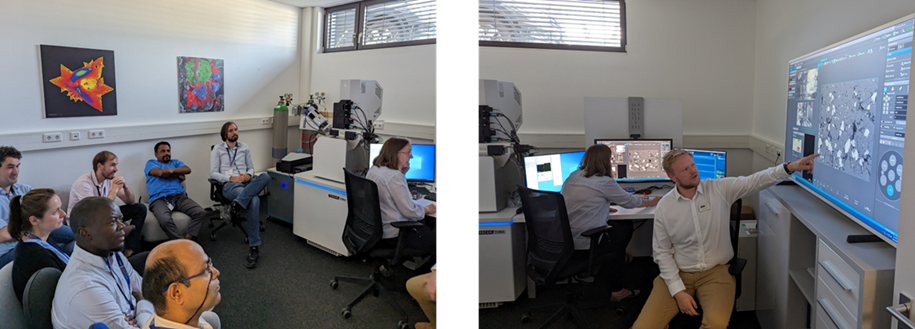I recently had the pleasure of returning to the beautiful city of Ulm and Oxford Instruments WITec Headquarters to support the first in-person workshop involving both WITec and NanoAnalysis. We were joined by researchers from around the globe who had made the trip specially to see Raman-EDS correlation in action. Numerous experts from a variety of fields were able to share ideas and discuss how correlated analytical methods could benefit their research. Now I appreciate some of you out there might have wished to attend, so I wanted to take this opportunity to give you the low down on the events that occurred.
Introductions
Attendees were greeted with beautiful sunshine but unfortunately, we had to go without the panoramic view of the Alps, as they weren’t quite visible. Our Marketing Director for Raman products, Harald Fischer, began the day with an excellent overview of Oxford Instruments and the history of WITec. This was followed by our Global RISE Business Manager, Jan Englert, giving a joyous talk on basic Raman theory and the Raman-in-SEM (RISE) Product. This expanded onto the crossover between Raman and EDS and how combining them gives us information on both bonding and atoms, respectively.
I have covered this in a previous blog, so click here should you require a refresher!

Representations of both electron and Raman microscopy processes
What is BEX?
Guests were also treated to our newest product, the Unity BEX detector by Dominik Zimmer, our applications scientist.
is a combination of backscattered electron and X-ray imaging in a single detector. This means users can instantly observe both microstructure and chemistry of samples. Personally, I am incredibly excited by this new instrument, as it allows rapid detection of points of interest, and I fully anticipate that Unity will take RISE analysis to new levels.
RISE Applications
The next session began with the dynamic duo of RISE applications, Ute Schmidt and me. We delved deeper into how RISE is used with a step-by-step guide to the RISE-EDS workflow. This was a little teaser for our demonstration in the later session. We then took the participants on a tour of applications where RISE has complemented SEM analytics, ranging from batteries through to geological inclusions.
We were all then treated to a fantastic talk from the invited speaker, Christian Müller from the University of Applied Sciences Zwickau. He described some of the amazing work that his group is doing into the application of Prussian Blue analogues. And of course, there were also some wonderful RISE images of the electrodeposited structure they are creating.

Left: Dominik Zimmer introducing BEX imaging using our new Unity detector; and right: Christian Müller taking us through Prussian Blue analogues
The Live Demonstrations
The afternoon session was a little more hands-on with a RISE-EDS demonstration given again by Ute and me. We took the opportunity to show the strength of both EDS and Raman for the analysis of a SiO/graphite battery anode. Cutting a long story short, we can use our backscattered electron detector to find regions of interest, analyse the carbon structures with Raman and understand the relative composition with EDS. The RISE system lets us analyse defects within the carbon structure that may affect the charging ability of the battery. This provides additional information on the performance of the battery that would not be possible with EDS alone.

Participants getting up close and personal with RISE-EDS
This was followed by a detailed demonstration of our WITec Project Suite 6.1 software by Thomas Meyer. This took the participants on a detailed tour of the capabilities within Project, starting with data processing through to our comprehensive data analysis tools.
The day was rounded off by Dominik, who gave an excellent demonstration on AZtecFeature, showing off our powerful particle analysis tool. Using a sample prepared from powder taken from the WITec manufacturing space, the guests were shown how smart, fast and accurate AZtecFeature can be.
This rounded off a day filled with how combining Raman and EDS within our SEM chamber provides a powerful solution for material analysis. It was an excellent opportunity to meet and discuss how RISE-EDS can be used with current and new users to the technique. I look forward to being able to host something similar at our facility here at High Wycombe. Until then, stay tuned for more RISE-based adventures!




